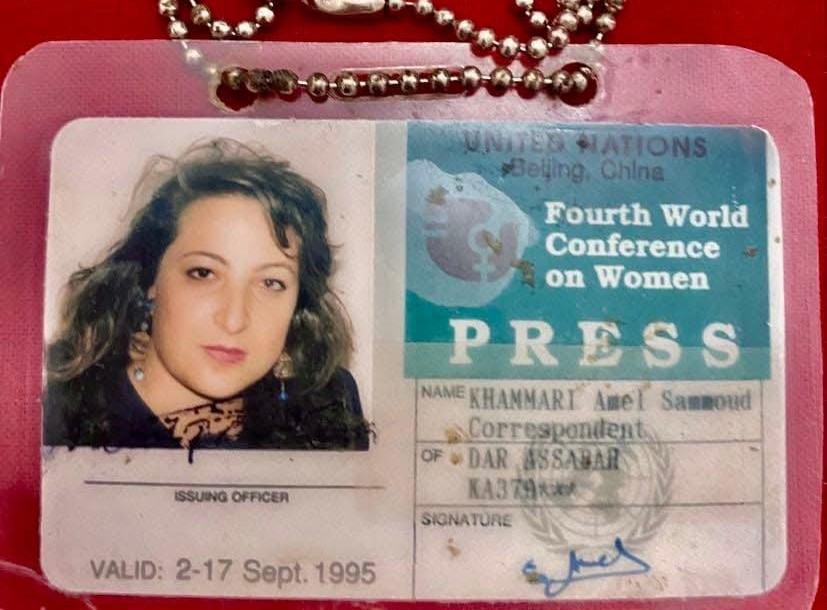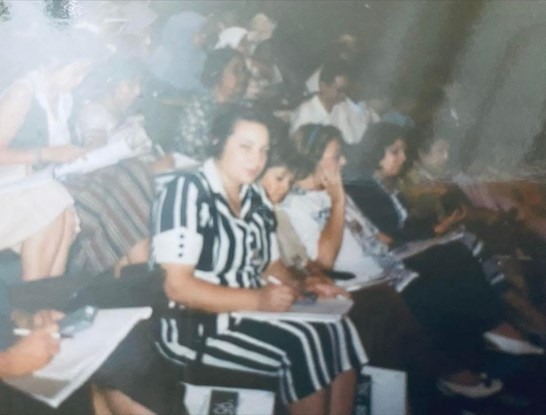
The 4th World Conference on Women – Beijing, 30 years later.
By Amel Samoud Khammari
15 September 1995 – 15 September 2025. On this very date, 30 years ago, I had the opportunity to participate in the Fourth World Conference on Women, which took place in Beijing, People’s Republic of China, under the auspices of the United Nations. At that time, I was not yet thirty years old. (something that was later reflected, 25 years later, in the Generation Equality Forum held in Mexico City and then in Paris in 2021, where the spirit of involving a new generation was strongly emphasized, with half of the participants being under 30).
It was my very first chance to participate in such a global gathering of this scale and nature. The feminist world was represented in its entirety through demonstrations, artistic and cultural performances, spanning from the opening ceremony to the events organized by civil society and governments.
My joy was indescribable when I received my badge as a Tunisian journalist to take part in the work of the World Conference on Women in Beijing, as well as in the parallel NGO Forum held in Huairou, near Beijing. I was also honoured with invitations to both the opening and closing ceremonies, which China organized with unmatched professionalism and grandeur.
This conference stood out for the impressive numbers it gathered: more than 17,000 participants, including 6,000 government delegates negotiating, over 4,000 accredited NGO representatives, a large number of international civil servants, and around 4,000 media professionals. The parallel NGO Forum held in Huairou attracted approximately 30,000 participants.

The conference marked a true turning point in the global roadmap for gender equality. The Beijing Declaration and Platform for Action, adopted unanimously by 189 countries, remains the world’s key policy framework for gender equality and women’s empowerment. It set objectives and strategic actions across 12 critical areas of concern:
- Women and poverty
- Education and training of women
- Women and health
- Violence against women
- Women and armed conflict
- Women and the economy
- Women in power and decision-making
- Institutional mechanisms for the advancement of women
- Human rights of women
- Women and the media (where I presented a paper on “Women and Media,” based on the Kalmar Declaration, which we prepared in Sweden at FOJO – The Institute for Journalism, Linnaeus University, Kalmar, in June 1995, together with several female journalists from across the globe)
- Women and the environment
- The girl child
Everything inspired excitement and awe, a world with all its colors and diversity, going beyond what the imagination of a young journalist, just beginning her path in the profession, could grasp. I had come from a faraway corner of the Mediterranean, representing the African continent, specifically the Francophone countries of North Africa.
I could not have imagined then that what I wrote when covering the conference and its historic opening ceremony would become part of the history of women’s struggle for liberation, 30 years later! Today, the United Nations system celebrates Beijing +30.
A quick journey through the global women’s conferences:
- The first World Conference on Women (Mexico City, 1975), held during the International Women’s Year, resulted in the Mexico Declaration on the Equality of Women and their Contribution to Development and Peace.
- The second World Conference on Women (Copenhagen, 1980) reaffirmed the landmark adoption of the 1979 Convention on the Elimination of All Forms of Discrimination against Women (CEDAW), but also denounced the gap between rights guaranteed to women and their actual exercise of those rights. It identified three priority areas: equal access to education, employment, and health services.
- The third World Conference on Women (Nairobi, 1985) established measures for progress on gender equality, such as constitutional and legal reforms, women’s participation in social and political life, and decision-making processes. It stressed that women’s participation across all human activities is a necessity, not just in areas “related to gender.”
- The fourth World Conference on Women (Beijing, 1995) is considered the most significant of all. It marked a shift from focusing on “women” to the broader concept of gender, recognizing the need to re-examine the entire structure of society and its institutions. Only through such fundamental restructuring could women be empowered as equal partners with men in all aspects of life. It also reaffirmed powerfully that women’s rights are human rights, and that gender equality is a matter of global concern beneficial to all.

From Beijing (1995) to the Generation Equality Forum (2021)
25 years later, the Generation Equality Forum was held under UN Women’s leadership, co-hosted by France and Mexico in partnership with civil society and youth. It provided a golden opportunity to renew the agenda for women’s rights, launch new partnerships, and accelerate urgent action.
The forum took place amid the global COVID-19 pandemic, which exacerbated gender inequalities and violence against women, highlighting the urgency of investing in women’s rights. It aimed to translate the Beijing Platform for Action into reality, through bold, targeted, and well-funded initiatives that break old barriers and enshrine women’s rights as human rights.
It also sought to mobilize financial and political commitments, and to build a multi-stakeholder movement ensuring accountability and concrete progress — a once-in-a-decade chance to push women’s rights to the centre of the post-COVID-19 global agenda.
Yet, despite the progress, as the UN Secretary-General himself stated, advances remain far too slow, with setbacks caused by renewed attacks on gender equality and the return of regressive laws.
Looking ahead – Beijing +30
Today, within the Decade of Action (2020–2030) to achieve the Sustainable Development Goals, the Beijing +30 review highlights both progress and shortcomings. Positive steps have been made at the national, regional, and international levels, through the CSW69 session, African Union meetings, and the critical role of civil society. However, the global community recognizes that, 30 years on, progress remains slow in fully implementing the Beijing Platform for Action.
This is why we must accelerate efforts to achieve genuine gender equality. No real progress can be made unless society recognizes that women, like men, are fully capable of driving humanity forward. This is the call of many organizations, both national and regional, such as:
- The Tunisian Association for Governance and Equal Opportunities for Women and Men in Decision-Making Positions (ATGEC)
- The African Women’s Development and Communication Network (FEMNET)
We must never forget that future generations will hold us accountable for the foundations we lay today. Let us ensure that, thirty years from now, they live in a better, fairer world than ours!
____________________________________________________________________________
About Amel Samoud Khammari
Amel Samoud Khammari is a seasoned leader, feminist advocate, and governance expert with over three decades of experience in public service and gender equality advocacy. She is the Founder and President of the Tunisian Association for Governance and Equal Opportunities for Women and Men in Decision-Making Positions (ATGEC), a pioneering organization dedicated to advancing gender parity and inclusive governance in Tunisia and beyond.
Currently serving as the Vice Chair of the Board of FEMNET, Amel provides strategic oversight for North African countries, championing feminist leadership, regional solidarity, and policy advocacy. She also leads as President of the 2GAP Tunisia Network, furthering efforts to promote women’s representation in economic and political spheres.
In her professional career, Amel has dedicated more than 33 years as a Senior Civil Servant at the Ministry of Economy and Planning, where she has been instrumental in shaping public policies for women, families, and the elderly. She presently serves as Communications Director at the General Delegation for Regional Development, ensuring inclusive and participatory approaches to regional and national development.
Through her diverse leadership roles, Amel continues to bridge governance, policy, and advocacy, tirelessly working to create equal opportunities for women and men in decision-making positions and to strengthen inclusive development across Africa.
